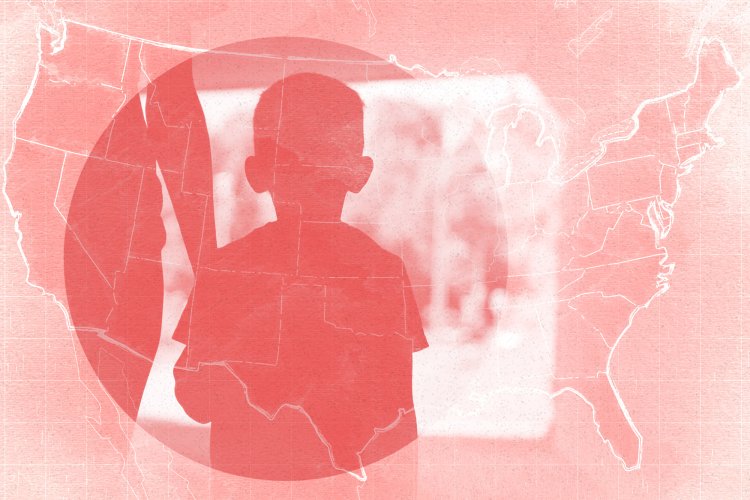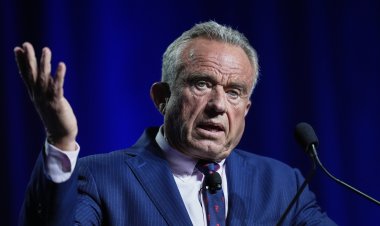‘Mami, I’m Scared’: A 7-Year-Old Struggles With Trump’s Immigration Policies
The Trump administration's assaults on both undocumented and legal immigrants are generating a climate of fear and uncertainty.

My 7-year-old leaned forward from the back seat of our car, scanning the wide sidewalk in front of his elementary school. It should have been a typical morning, with a hint of rain, the high-pitched laughter of children, and the familiar stop-and-go of vehicles dropping off kids for another school day.
“What are you scared of?” I asked, turning around to make eye contact with him.
“What if I get deported?” my American-born child inquired.
I wasn't entirely taken aback by his question. Earlier that week, after hearing about how ICE arrests and deportations were affecting our community in the Bay Area, his 13-year-old brother had asked me if I was at risk of being arrested by ICE. Both of my boys are aware of my Cuban roots, and while they might not grasp the complexities of the Cuban Adjustment Act or similar immigration laws that have paved my relatively privileged path, they’ve absorbed enough of the current climate to feel that our American existence could be in jeopardy.
I explained to them that I’m a U.S. citizen, and it’s unlikely I’d be removed from the country. Yet, the Trump administration's shift from targeting undocumented immigrants to those with visas and green cards doesn’t inspire confidence.
I can’t reassure my children with the belief I once held: that citizenship acts as an unbreakable barrier. Not when the president states his administration is exploring legal avenues to "deport" citizens. Not when a 10-year-old U.S. citizen's cancer treatment was interrupted after her undocumented parents were ordered back to Mexico, leaving them to choose between uprooting the family or being separated from their daughter during treatment in the U.S. Not when law enforcement misleads U.S. citizens like Federico Arellano, who saw his wife deported right after delivering twins, while their four children, three of whom are U.S. citizens, faced separation. Not when recent history repeatedly shows that the state can act outside the bounds of legality, as illustrated by the case of Kilmar Armando Abrego García, a Maryland man caught in a Salvadoran mega-prison while the Trump administration defies a Supreme Court order to return him.
I reached across the seats to offer my son a comforting touch, knowing that this question would once again test my resolve to speak honestly with my children.
“I don’t think that’s going to happen,” I told him.
“But I look just like the people who are getting deported,” he replied, his voice light and uncertain.
This is indeed true: My youngest’s mixed ethnicity reflects a variety of identities, all of them brown. At a Day of the Dead celebration, he’s often perceived as Mexican. In Hawaii, he’s mistaken for Polynesian. More than once, people have asked if he’s Palestinian.
Taking a deep breath, I wanted to tell him, “You're safe, I swear.” But my child is no fool. He may not know legal terminology, lacking familiarity with concepts like “family separation” or the nuances between citizenship and immigration status. However, he has felt the weight of the state since his very first moments when a judge determined his fate by removing him from his birth mother. The scars of that experience — being handed over and reclassified in adoption — linger in him, although he may not have the words to express it.
So when he asks, “What if I get deported?” what he’s genuinely asking is, “Will I be taken away again?” And in my attempts to reassure him, he can likely hear the tremor in my voice that I try to conceal.
He pressed on that day, his brow furrowed in concentration. “But what if it does happen?” he asked. “What if they take me anyway?”
I could only offer him the most honest response I could devise: “Then we’ll fight. Your other mom [my ex-wife] and I, we will fight like hell to get you back. That’s a promise.”
I could see the weight of my words settle within him. Not complete relief, nor a solution, but a lifeline—something to hold onto should the ground underneath him shift.
What I didn’t voice, but felt deep in my core, was the yearning to shield my kids from not just deportation or the terrifying systems that threaten to tear us apart, but from the burden of pondering such fears altogether. I want to keep them from internalizing this anxiety, from developing a hyper-awareness of vulnerability that distracts them from simply being kids and enjoying their lives.
A friend reminded me that we often lie to our children to protect them. I could simply say, “It’s never going to happen. Don’t worry.”
Yet, my son lives in a reality filled with visible signs: he sees ICE vans and attends school in California, where the state Department of Education reports that 3 percent of schoolchildren are immigrants and 44 percent belong to immigrant families. The specter of deportation is never too far away. Recently, with executive actions rendering places of worship, hospitals, and schools vulnerable to enforcement, students are faced with the unsettling reality of arrests. In Sackets Harbor, New York, three children from a dairy farm found themselves taken by immigration officers.
Even if nothing occurs—if no one comes knocking, no one shows up with paperwork or questions—this fear has already imprinted on him. Not long ago, I laid down for a moment due to a headache when the doorbell rang. My son froze. Since I wasn’t expecting anyone, I chose not to answer. He stayed in the room with me, tension in his shoulders, waiting for the ringing to stop. He then asked his older brother if he could check to see if the shadow outside had finally disappeared. Eventually, he crawled into bed with me.
One of his close friends, who comes from a large family that immigrated from the Middle East, is undocumented. It’s easy to imagine that they talk about their situations, even as they giggle and race around in the park or argue about whether to add chamoy to their mangonadas at the local ice cream shop.
At therapy, my son opened up about his worries regarding deportation, expressing his feelings of helplessness. His therapist gave him a laminated card with instructions on how to respond if confronted by ICE: “Do not answer any questions…. Do not sign anything.” The card advises my 7-year-old to say, “I choose to exercise my constitutional rights.”
“You can keep that,” the therapist told him.
“Can I have some more, for my friends?” he queried.
“How many would you like?”
He pondered for a moment.
“Ten,” he replied.
Mathilde Moreau for TROIB News












